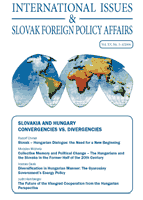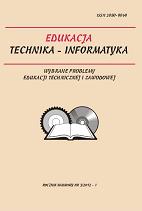
We kindly inform you that, as long as the subject affiliation of our 300.000+ articles is in progress, you might get unsufficient or no results on your third level or second level search. In this case, please broaden your search criteria.


The problems of the V4 countries in the area of the power industry are very similar. The Czech Republic, Poland, Hungary as well as Slovakia are one-sidedly dependent on the Russian supplies of oil, gas and nuclear fuel. All four countries have built their energetic infrastructure and mainly the pipeline system in the East-Western direction exclusively while North-Southern links are either non-existent or very insufficient. However, there are several discrepancies between these countries which are reflected in the energy policy and have an impact on their energy security. While the Czechs and the Poles can cover a significant part of their energy demand by domestic sources, the position of the Hungarians and the Slovaks is much more complicated. As a consequence of their inland position, the two countries have remained almost exclusively dependent on the pipeline network from the times when they were both satellites of the Soviet Union. Despite similar interests in the area of energy policy, the reality of the past few years suggests that this is not the case. It is given not only by objective logistical-economic factors but often also by political aspects.
More...
The Slovak-Hungarian understanding was never an issue as lucrative as to have politicians fighting for it. The rhetoric of confrontation already had its followers not only among politicians but also in the wide public. Naturally, many people showed a rather reserved attitude to the issue of understanding- both on the Slovak and the Hungarian side. Despite a legitimate skepticism towards politicians, it could be perhaps useful to attempt to meet for a common discourse or even a potential agreement on what goal the Slovaks and the Hungarians wish to pursue together in the united Europe. Perhaps this is not a task too difficult despite its almost statesman character. The only difficult thing is to find the way to this common goal.
More...

The overall goal of the analysis is to present and compare the security policies of both, Slovakia and Hungary after their accession to the EU and NATO as well as to focuse on the possible fields of cooperation. The factors determining the Slovakia’s and Hungary’s security policy are more or less of similar character as for geopolitical factors and their implications for Slovakia and Hungary and they are reflected also in the security and strategic documents. As concluded, the potential for cooperation between Slovakia and Hungary in the field of security policy is big.
More...
After May 2004, the newly declared Visegrad Cooperation appeared in the Hungarian foreign policy and political public opinion – because of its history – as some sort of cooperation of a dubious nature. Its past has been judged on the basis of the fiascos and fruitless exercises. Left- and right-wing politicians alike share this view. However, its future perspectives and opportunities are being judged differently. On the whole, the left is sceptical while the right sees distinct opportunities in the future. They perceive its importance primarily in terms of the traditional good Polish-Hungarian relationship, the so-called Polish-Hungarian axis. The Hungarian foreign policy is facing a new situation: it must reconsider its objectives, tasks and interests. Foreign policy documents and concrete steps of Hungarian governments stress the importance of cooperation within the common foreign- and security framework of the EU, particularly with respect to Hungary’s role in the Western Balkans, as well as Hungary’s tasks in the Eastern policy – to mention but the joint actions of the V4 in these two areas.
More...
Complete Bibliography of the journal. It consists three parts: - Bibliography of "International Issues" - Bibliography of "Slovak Foreign Policy Affairs" - Bibliography of "International Issues and Slovak Foreign Policy Affairs"
More...
The author looks through those problematic points in the Slovak-Hungarian relations, which are originated somehow from the historical consciousness. The article divided them into three subtitles: Communication problems, Memory of grievances, and Slovaks in the mind of Hungarians. Communication problems in this case mean the comparative analysis of using words Uhorsko, Maďarsko, (Magyarország), (Felvidék) and Slovensko. Subchapter Memory of grievances deals with the question of the assimilation process in the era of dualism, of the question of Trianon, and the Hungarian years of homelessness between 1945 – 1948. Finally, the third part of the article highlights some points which introduce how Slovaks are present in the mind of Hungarians.
More...
Hungary aims at reconciling its diversification efforts and improvement of its relations with Russia. In order to achieve such a balance, diversification is understood not as a result of Russian threat, but as a consequence of existing imparities in the country’s energy system. Hungary has to decrease the level of its energy supply vulnerability anyway, not particularly because of Russia’s policy. At the same time, Russian supplies are going to remain crucial in the country’s and Europe’s imports even in a more diversified energy landscape. Therefore Hungary tries to help in finding a new balance of interests in the EU-Russia Energy Dialogue and avoid any breakdown in these relations.
More...
The paper deals with the issue of Slovak-Hungarian relations in the period between the two World Wars, focusing on the way political circumstances were reflected in the representations of the ‘national past’ of both the Slovaks and the Hungarians. The competition and assertion of different national ideologies in the area of the present Slovakia was closely linked with attempts legitimize own status and marginalize contrast groups. In this period, apart from an internal political character, this competition was also significantly reflected in the foreign policy as it came along with the demand of maintaining or revision of status quo. The author points at the return to more distant history in reconstructing and deconstructing the national past particularly after 1989. This still remain the subject of political competition, albeit under new circumstances.
More...

The entry deals with the way of perception of chosen terms referring to school and social environment by students of the University in Rzeszow in 2010 and 2011. The comparison is made by the means of a semantic differential by students of the field of study called technical and information education and pedagogy.
More...
The structural components of cultural readiness of future specialists in agriculture are proved in the article and corresponding criterions and formation levels of these components are proposed.
More...

The article deals with the problem of forming speech culture in university students. The speech aspect of the culture of professional communication is analyzed. The tasks to develop speech skills are offered.
More...
The purpose of the present study is to make the diagnosis and to draw up the report on accordance of the vocational education received at art schools to expectations of future employers. Following questions express extensive problems, taken in survey research: - What computer programmes are used at secondary art schools? - What graphic design programmes are known by students of secondary art school and how they assess their level of competence required for usage of those programmes? - Are the graduates of secondary art school accoutred with knowledge and qualities accordant with the expectations of their future employers?
More...
The main objective of this final paper is recognizing the importance of developing entrepreneurial skills in the lessons of Technology as well as practical verification of our proposed project, which aims to develop entrepreneurship.
More...
The basic assumption of pedagogy is associated with the accepted model of human. Pedagogy of naturalistic assumes that a person is natural object. Pedagogy of humanistic complements this assumption a new paradigmatic. Human being is a special entity. What is the specificity of this? This question is looking for answers in this development. Deferent studies in labor education depends on the answer of this question.
More...

Developing the new educational courses and improving methods of training in the higher educational institutions will help both the young generation and the adult people to cognize the peculiarities of a human being to find their place in the complex human relationships and understand continuous changes in the present world are shown in the article.
More...